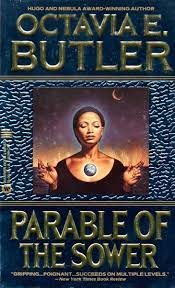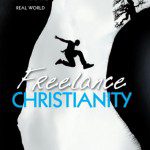All that you touch, you Change.
All that you Change, Changes you.
The only lasting truth Is Change.
God Is Change
These are the opening lines in “Earthseed: The Books of the Living,” a collection of notebooks compiled by Lauren Olamina, the main character in Octavia Butler’s dystopian, frighteningly believable vision of the near future, Parable of the Sower. Lauren is a late teen who lives inside a gated community with her Baptist preacher father, family, and neighbors, sheltered from the increasing social chaos and anarchy caused by global climate change and economic crises that surrounds them. Precocious and hyperempathic, Lauren seeks throughout the novel to create a vision of human reality, as well as that which is greater than us, that encompasses the terrors that surround her. She calls this developing vision “Earthseed”—the fundamental truth of Earthseed is that the most basic truth of reality is change.
When asked in an interview about the sources of and influences on Lauren’s creation of Earthseed, Octavia Butler said the following:
I asked what was the most powerful force I could think of? What one thing could we not stop no matter how hard we tried? The answer I came up with after some thought was “change.” We can do a lot of things to influence the ongoing processes of change. We can focus them, alter their speed or impact, in general we can shape change, but we can’t stop it no matter how hard we try. Throughout the universe, the ongoing reality is change . . . Since change is the one inescapable truth, change is the basic clay of our lives. In order to live constructive lives, we must learn to shape change when we can and yield to it when we must. Either way, we must learn and teach, adapt and grow.
In her Earthseed notebook, Lauren writes that “As wind, as water, as fire, as life, God is both creative and destructive, demanding and yielding, sculptor and clay. God is Infinite Potential. God is Change.” This is not a personal God who responds to prayer or seeks relationship with human beings. But this is a God that can be shaped, although never controlled, by those who recognize that the only truth that we can depend on is that everything changes.
The Earthseed God is about as far from the traditional Christian notion of God which I grew up with as one can get. The Bible is full of reminders that God is dependable, that God never changes, that change is human—and therefore suspect and perhaps a result of human sin—but God is a solid rock to hang on to when things are unmanageable, an anchor in the stormy seas of life. The prophet Malachi puts it succinctly: I am the Lord, I change not. As is always the case, however, even with sacred texts, there is more to the story.
Lauren Olamina writes that we should “create no images of God. Accept the images that God has provided. The are everywhere, in everything . . . The universe is God’s self-portrait.” If we take that suggestion seriously, what might we conclude from careful observation of the world that God created? If the universe is God’s self-portrait, it is clear that God prefers change to stability, loves freedom and creativity, and favors novelty over the familiar. The very process of life guarantees continuing diversification and change. God also favors process over finality, risk over safety, and imperfection over perfection.
If one focuses on the stories provided in the Gospels rather than on the doctrines and dogmas that have been fashioned over the succeeding centuries, it is also clear that Jesus understood himself as an agent of radical change. The creators of “The Chosen,” a multi-year cinematic treatment of the life of Jesus that is currently halfway through its second season, have found interesting ways to embed this aspect of Jesus and his message in their various episodes. In the final episode of Season One, Jesus and his entourage (there are only seven or eight of them at this point) are off on their first road trip.
To the dismay of the disciples, Jesus chooses to go straight through Samaria. Samaritans and Jews hate each other for all sorts of reasons; accordingly, the disciples assume that they should walk a few extra miles and do an end run on Samaritan territory. But Jesus is insistent that, against all norms, they are going straight through Samaria (as it turns out, he wants to meet his appointment with the Samaritan woman at the well). With slight annoyance, Jesus says that “If we’re going to have a question-and-answer session every time we do something you’re not used to, it’s going to be a very annoying time together for all of us.” On an almost daily basis, Jesus chooses to do and say things that stir up the waters, simply because “we’ve always done it this way” is the greatest obstacle to needed change.
In the same episode, Peter—who is already working hard to become Jesus’ favorite–complains about Jesus’ calling Matthew the tax collector to become part of His band of disciples. As Peter is protesting, Jesus reminds Peter that he wasn’t an obvious choice to be a disciple either. Peter responds, “But that’s different. Matthew is a tax collector.” Jesus turns to Peter and says, “Get used to different.”
Get used to different. That could be the bumper sticker for the past fifteen months, as each of us has been forced out of our comfort zones and expectations in order to grapple on the fly with circumstances that no one was prepared for. Speaking only for myself, I have learned two things about change during the pandemic. I’m not as welcoming of change as I thought I was, and I’m more capable of change than I thought I was. I regularly urge my students to challenge old and comfortable assumptions, but this is more difficult in practice than in theory. As William James writes, “in the matter of belief, we are all extreme conservatives.”
At Living Stones last Sunday, the monthly seminar group I have led after the 10:00 service for the past nine years, we celebrated our first in-person meeting in sixteen months. The group met on a biweekly basis on Zoom through the pandemic, but a few of the regulars who are not tech-comfortable did not join in the remote sessions. As we compared notes, a woman to my right—a liberal and progressive person if I’ve ever met one—said bluntly “I hate change.” Most everyone in the room nodded in agreement. Change sucks, but is as inexorable as death and taxes. As Lauren Olamina writes in her Earthseed notebook, “All that you touch, you change. All that you change, changes you. The only lasting truth is change. God is change.”
Angels are iconic inhabitants of the spiritual realm, pervasive throughout sacred texts. If we take artistic renditions of angels seriously, they seem sweet, soft, cuddly, and pretty. But those are sanitized versions of the real angel stories. An angelic visitation in scripture is always a harbinger of change, an indication that your world is never going to be the same again. Angels never show up simply to announce that “everything’s fine and you’re on the right track—keep doing what you’re doing.” Angels are always the heralds of new beginnings, inviting us to adventure. Angels announce new departures and the beginning of something whose end is not in view. And the first thing the angel always says is that we don’t need to be afraid of change and disruption. “Don’t be afraid,” the angel says. “Get used to different,” Jesus says in “The Chosen.” As Jesus says in the final pages of Revelation, “Behold, I am doing a new thing.” For those wanting to have a relationship with what is greater than us, these are good things to remember.













